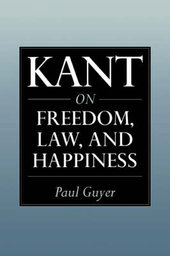
|
Kant on Freedom, Law, and Happiness
Paperback / softback
Main Details
| Title |
Kant on Freedom, Law, and Happiness
|
| Authors and Contributors |
By (author) Paul Guyer
|
| Physical Properties |
| Format:Paperback / softback | | Pages:456 | | Dimensions(mm): Height 230,Width 153 |
|
| Category/Genre | Western philosophy - c 1600 to c 1900 |
|---|
| ISBN/Barcode |
9780521654210
|
| Classifications | Dewey:193 |
|---|
| Audience | | Tertiary Education (US: College) | | Professional & Vocational | |
|---|
| Illustrations |
Worked examples or Exercises
|
|
Publishing Details |
| Publisher |
Cambridge University Press
|
| Imprint |
Cambridge University Press
|
| Publication Date |
13 February 2000 |
| Publication Country |
United Kingdom
|
Description
Kant is often portrayed as the author of a rigid system of ethics that suits perfectly rational beings but not human beings. The twelve essays in this collection by one of the world's preeminent Kant scholars argue for a radically different account of Kant's ethics. They explore an interpretation of the moral philosophy according to which freedom is the fundamental end of human action, but an end that can only be preserved and promoted by adherence to moral law. Paul Guyer radically revises the traditional interpretation of Kant's moral and political philosophy and shows how Kant's coherent liberalism can guide us in current debates.
Reviews"I^Kant on Freedom, Law, and Happiness is a well-researched and well-argued contribution to Kantian studies.I^Kant on Freedom, Law, and Happiness is an important book in Kantian studies that advances a unifying vision of Kant's practical philosophy. The change of view that Guyer advocates is welcome and reveals a side of Kant that has perhaps been veiled for too long. Although the book will undoubtedly be of interest to anyone studying Kant's practical philosophy in a scholarly manner, it may also be of interest to the general reader of philosophy who is prepared to approach the book with the patience and tenacity that Guyer's extended arguments often demand. In either case readers will be rewarded for their efforts with a deeper understanding of both Kant and of central philosophical issues related to freedom, happiness and morality." --Metapsychology Online Review
|